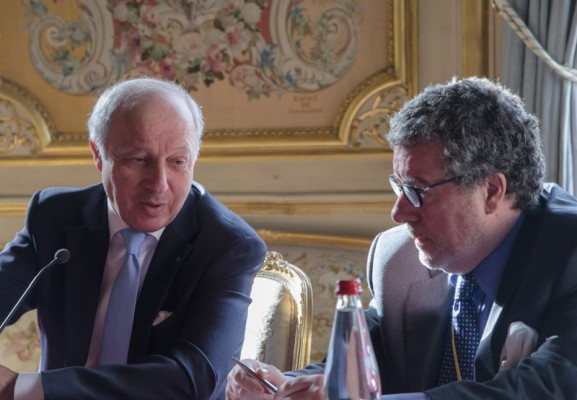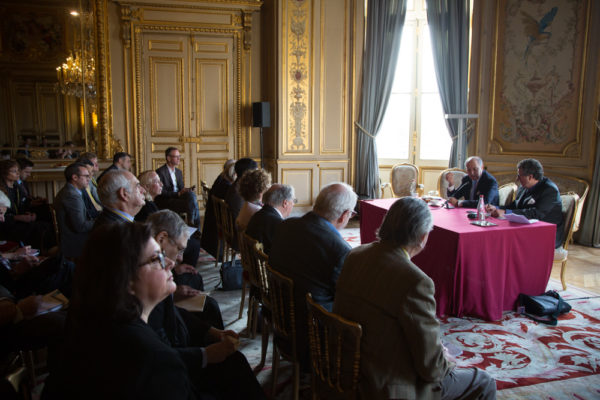 France is eager to help out in the world’s trouble spots, but there’s also a risk that a big Western power coming to the aid of the citizens of a foreign country can actually aggravate a situation, French Foreign Minister Laurent Fabius told more than 30 AAPA members on April 16.
France is eager to help out in the world’s trouble spots, but there’s also a risk that a big Western power coming to the aid of the citizens of a foreign country can actually aggravate a situation, French Foreign Minister Laurent Fabius told more than 30 AAPA members on April 16.
Meeting “on-the-record” for over an hour with us in the ornate salons of the Quai d’Orsay, Mr. Fabius said: “There are indeed many, many crises, difficulties, hot spots in the world. The risk – and we should bring what help we can to these crises… – is that we could worsen the crises,” he added.
On specific problems today, Mr. Fabius lamented what he called “the Syrian tragedy,” urging more help for the “terrifying situation” facing millions of refugees from this conflict. He reiterated France’s opposition to any dealings with Bashar Al-Assad, the Syrian leader, whom he stated cannot be part of a much-needed political solution.
He disclosed that France and its partners are “discreetly and secretly” working towards a political solution and a “unity government” in Syria, but declined to elaborate.
“When history is written, we will see that the Syrian tragedy is the greatest human drama of the beginning of this century,” he said.
Mr. Fabius told us that even if France is far from being the largest country in the world, it has to be reckoned with on the foreign policy chessboard because it implements a “Global Foreign Policy”, encompassing its military, economic, diplomatic and cultural assets, as well as being a permanent member of the UN Security Council.
France, he said, is a “special country” because of the various levels of its influence and the way it carries out its “global” diplomacy, which he explained was geared around four major axes: 1) Peace and security, but not necessarily “pacifism”; 2) the well-being and preservation of the planet; 3) a certain vision of Europe and the need to boost and “reorient” the European ideal and 4) the bolstering of the French economy and the spread of French influence in the world.
On Iran, he cautioned that a nuclear deal was not yet in the bag, despite a framework agreement, and he repeated that a number of details remain to be worked out before the June 30 deadline.
Regarding the Yemeni crisis, Fabius said France wanted a return to “stability” and to rule by the legitimate government of President Hadi, but said France had no vocation to intervene militarily, although it supports efforts by the regional Coalition.
Addressing a number of other “hot spots,” Mr. Fabius maintained that “firmness and dialogue” was the best policy with Russia regarding Ukraine, and warning that the West could bolster punitive sanctions against Moscow if there were more serious violations of the Minsk Accords. The taking of the strategic port of Mariupol by rebels, for example, would be a game changer, he stated.
Following recent visits to the Middle East, Mr. Fabius indicated that negotiations were moving with Qatar for the purchase of French-made Rafale combat aircraft (two weeks after our meeting, Qatar said it will acquire 24 jets for an estimated value of $7.0 billion). Furthermore, talks on additional sales of Rafale jets to the UAE were “going in the right direction,” he said.
-John Keating
